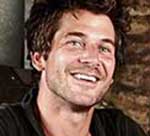Immersed in the future
Inventor and television presenter Tom Lawton argues that innovations, including his own 360º camera and virtual reality, are poised to completely transform the TV industry.

Lawton: 14-year vision
During the mid-nineties I found myself living in South Africa and working on high-end virtual reality applications, and it blew my mind. I happened to have access to a computer that was about the size of a dishwasher and cost £250,000 (US$368,000). This incredible technology that I sat in front of as a 20-year-old has, over the past two decades, evolved into a screen that sits in our hands.
Shortly after that I was in a reality television show called Lost for the UK’s Channel 4, where I was blindfolded and dumped on an island in Northern Russia and had to find my way back using just my wits. I had never been involved in TV before and when it was broadcast it left me slightly frustrated and unfulfilled because it didn’t truly capture the event in the way I had experienced it.
Both of these experiences inspired me on a journey to try to resolve the shortcomings of TV. It was while I was sitting on a train travelling through India in 2001, before iPods, camera phones and streaming even existed, and I had a vision – a vision of an invention. I’ve spent the past 15 years working to make that vision a tangible reality: an ultra-high-fidelity 360º camera, a means whereby people can share experiences in their entirety, in a 360º way, in a ‘bubble’ if you like. I wanted to produce a means of sharing this view from a device in your hand to enable people to tell stories. This immersion is the future of TV.
During my development process I had an inspiring experience. It was April 2003 and I had a phone call from a friend in Baghdad who was on the ground in Firdos Square watching as Saddam’s statue was being pulled down. He and I had talked a lot about my vision for 360º space and he called me to ask what I was seeing on the news. I told him and he explained that what he could see in reality – outside the frame of the cameras – were three tanks with chains pulling the statue down and the Iraqis had been kettled into an area where they were attacking the statue. The statue wasn’t coming down on its own, as we were seeing. This was total propaganda in motion. I’m not saying that it was great conspiracy and we were all being lied to, but what we were seeing was not the full picture.
I’m a truth-ist and a believer in empathy as the most needed requisite in the world. Being able to put yourself in other people’s shoes is truly the way to move society forward, and enabling the media to be more open and truthful is a central aspect of this. I want to enable people to be storytellers. I believe that TV is more than just content, it’s about storytelling, taking complicated things and making something real.
And I’m not on my own. While these ideas seemed to be very esoteric back in 2001, 2002, 2003, it’s now starting to actually happen. YouTube launches 360º video next month; Sky has invested in 360º multi-camera capture and display specialist Jaunt in America; and both Steven Spielberg and David Attenborough have recently spoken about 360º and virtual reality. Attenborough said: “We’re on the brink of simply enormous change in visual communication,” while Spielberg described the evolvement of television as a three-dimensional experience as being “the future.”
We’ve seen how a gamer inspired the Oculus Rift virtual reality headset to get inside the world of games. I’m a storyteller who wants to bring every aspect and side of a story to an experience. By using the technology I’ve developed, we’ll be able to see and hear what it’s like to stand on stage with One Direction or what it’s like to be in the House of Lords.
It’s a hugely exciting time in the evolution of television, and as with great inventions like the bicycle, it doesn’t belong to just one inventor. There’s evolvement and variation. Other visionaries are also developing similar versions, but for me, my concept is the culmination of a 14-year vision since sitting on that train in India, and this invention will cement my ambition to put storytelling at the heart of the visual story.
Tom Lawton is speaking at The Edinburgh International Television Festival’s Tomorrow’s People EdTalks event, sponsored by UKTV, at the Royal Overseas League in Mayfair, London at 18.30 on March 26. For more information and to book your ticket click here.












.jpg)




























